| Listing 1 - 10 of 10 |
Sort by
|
Book
ISBN: 1108102514 1108102913 1108103316 1108104924 1316986721 1108103723 1107188830 1316638618 9781316638613 9781107188839 1108100112 9781316986721 Year: 2017 Publisher: New York, N.Y. Cambridge University Press
Abstract | Keywords | Export | Availability | Bookmark
 Loading...
Loading...Choose an application
- Reference Manager
- EndNote
- RefWorks (Direct export to RefWorks)
Since the 1970s, movements aimed at giving Muslim women access to the serious study of Islamic texts have emerged across the world. In this book, Masooda Bano argues that the creative spirit that marked the rise and consolidation of Islam, whereby Islam inspired serious intellectual engagement to create optimal societal institutions, can be found within these education movements. Drawing on rich ethnographic material from Pakistan, northern Nigeria and Syria, Bano questions the restricted notion of agency associated with these movements, exploring the educational networks which have attracted educated, professional and culturally progressive Muslim women to textual study, thus helping to reverse the most damaging legacy of colonial rule in Muslim societies: the isolation of modern and Islamic knowledge. With its comparative approach, this will appeal to those studying and researching the role of women across Africa, the Middle East and South Asia, as well as the wider Muslim world.
Islamic modernism. --- Islamic renewal. --- Muslim women --- Sex differences in education. --- Women in Islam. --- Islam --- Education --- Islamic reform --- Islamic revivalism --- Islamic revivalist movement --- Ṣaḥwah (Islam) --- Religious awakening --- Wahhābīyah --- Modernism, Islamic --- Education. --- Reform --- Renewal --- Sex differences --- Women - Social conditions - Islamic countries --- Women's rights - Islamic countries --- Women - Education - Islamic countries --- Islamic modernism --- Islamic renewal --- Muslim women - Education --- Sex differences in education --- Women in Islam --- Women --- Women's rights --- Religious studies --- Religious texts --- Organizations --- Participation --- Book
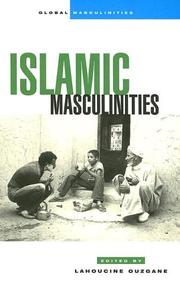
ISBN: 1842772740 1842772759 9781842772744 9781842772751 Year: 2006 Publisher: London/New York Zed Books
Abstract | Keywords | Export | Availability | Bookmark
 Loading...
Loading...Choose an application
- Reference Manager
- EndNote
- RefWorks (Direct export to RefWorks)
This innovative book outlines the great complexity, variety and difference of male identities in Islamic societies. From the Taliban orphanages of Afghanistan to the cafés of Morocco, from the experience of couples at infertility clinics in Egypt to that of Iraqi conscripts, it shows how the masculine gender is constructed and negotiated in the Islamic Ummah. It goes far beyond the traditional notion that Islamic masculinities are inseparable from the control of women, and shows how the relationship between spirituality and masculinity is experienced quite differently from the prevailing Western norms. Drawing on sources ranging from modern Arabic literature to discussions of Muhammad's virility and Abraham's paternity, it portrays ways of being in the world that intertwine with non-Western conceptions of duty to the family, the state and the divine.
Masculinity --- Men --- Religious aspects --- Islam --- Social conditions --- Developmental psychology --- Social problems --- Sexology --- Sociology of the family. Sociology of sexuality --- Religious studies --- Middle East --- Masculinity - Religious aspects - Islam --- Men - Islamic countries --- Men - Islamic countries - Social conditions --- genderstudies --- genderidentiteit --- islamitische mannen --- Violence --- Homosexuality --- Identity --- Sexuality --- Spirituality --- Book
Book
ISBN: 9781474483865 9781474423182 9781474423199 1474423183 1474423191 9781474423205 1474423205 9781474476751 1474476759 Year: 2021 Publisher: Edinburgh Edinburgh University Press
Abstract | Keywords | Export | Availability | Bookmark
 Loading...
Loading...Choose an application
- Reference Manager
- EndNote
- RefWorks (Direct export to RefWorks)
Based on original and previously unexamined sources, this book provides a critical and systematic analysis of the role of queens, eunuchs and concubines in medieval Islamic history. Spanning over 600 years, it explores gender and sexual politics and power from the time of the Prophet Muhammad through the Umayyad and Abbasid periods to the Mamluks in the 15th century. Geographically its coverage extends from Iran and Central Asia to North Africa and Spain. Drawing on specific historical case studies and events, it looks at the role of women, mothers, wives, eunuchs, concubines, qahramans and atabegs in the dynamics and manipulation of medieval Islamic politics.
Islam --- Sociology of the family. Sociology of sexuality --- anno 500-1499 --- Spain --- Central Asia --- Iran --- North Africa --- Sex role --- Sex --- Women --- Eunuchs --- Political activity --- Islamic Empire --- Civilization. --- Gender --- History --- Politics --- Sexuality --- Book --- Islamic civilization. --- To 1500 --- Islamic Empire. --- Islamic countries.
Book
ISBN: 9781474455435 9781474455428 9781474455459 147445545X 1474455425 Year: 2019 Publisher: Edinburgh : Edinburgh University Press,
Abstract | Keywords | Export | Availability | Bookmark
 Loading...
Loading...Choose an application
- Reference Manager
- EndNote
- RefWorks (Direct export to RefWorks)
Following a period of rapid political change, both globally and in relation to the Middle East and South Asia, this collection sets new terms of reference for an analysis of the intersections between global, state, non-state and popular actors and their contradictory effects on the politics of gender.
Sociology of the family. Sociology of sexuality --- Gender --- Politics --- Religion --- Book --- Intersectionality --- Middle East --- South Asia --- Muslim women --- Sex role --- Sex discrimination --- Social conditions --- Religious aspects --- Islam. --- 2000-2099 --- Islamic countries.
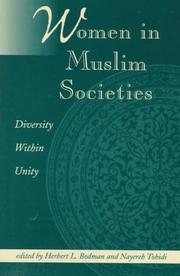
ISBN: 1555875785 1555875580 Year: 1998 Publisher: Boulder Rienner
Abstract | Keywords | Export | Availability | Bookmark
 Loading...
Loading...Choose an application
- Reference Manager
- EndNote
- RefWorks (Direct export to RefWorks)
Exploring the status, roles and contributions of Muslim women, not only in the Middle East, but also in Africa and Asia, the authors stress the importance of historical context, local customs, the policies that define their status, and the opportunities or constraints they may experience.
Religious studies --- Islam --- Sociology of culture --- Sociology of the family. Sociology of sexuality --- Physiology: reproduction & development. Ages of life --- Nasrin, Taslima --- Middle East --- South Asia --- Central Asia --- Asia --- Africa --- Muslim women. --- Women in Islam. --- Women --- Social conditions --- Muslim women --- Women in Islam --- Islamic countries --- Musulmanes --- Femmes dans l'Islam --- Femmes --- Social conditions. --- Conditions sociales --- ro: ed. by --- Islamic women --- Women, Muslim --- Muslimahs --- Gender --- Female circumcision --- Power --- Norms --- Book --- Veil
Book
ISBN: 9780674725164 0674725166 Year: 2013 Publisher: Cambridge, Mass. Harvard University Press
Abstract | Keywords | Export | Availability | Bookmark
 Loading...
Loading...Choose an application
- Reference Manager
- EndNote
- RefWorks (Direct export to RefWorks)
Frequent reports of honor killings, disfigurement, and sensational abuse have given rise to a consensus in the West, a message propagated by human rights groups and the media: Muslim women need to be rescued. Lila Abu-Lughod boldly challenges this conclusion. An anthropologist who has been writing about Arab women for thirty years, she delves into the predicaments of Muslim women today, questioning whether generalizations about Islamic culture can explain the hardships these women face and asking what motivates particular individuals and institutions to promote their rights. In recent years Abu-Lughod has struggled to reconcile the popular image of women victimized by Islam with the complex women she has known through her research in various communities in the Muslim world. Here, she renders that divide vivid by presenting detailed vignettes of the lives of ordinary Muslim women, and showing that the problem of gender inequality cannot be laid at the feet of religion alone. Poverty and authoritarianism—conditions not unique to the Islamic world, and produced out of global interconnections that implicate the West—are often more decisive. The standard Western vocabulary of oppression, choice, and freedom is too blunt to describe these women’s lives. Do Muslim Women Need Saving? is an indictment of a mindset that has justified all manner of foreign interference, including military invasion, in the name of rescuing women from Islam—as well as a moving portrait of women’s actual experiences, and of the contingencies with which they live.
Islam --- Sociology of the family. Sociology of sexuality --- Human rights --- Muslim women --- Women's rights --- Social conditions --- Civil rights --- AUTHORITARIANISM -- 362.17 --- #SBIB:39A11 --- #SBIB:39A10 --- #SBIB:316.331H360 --- Islamic women --- Women, Muslim --- Women --- Social conditions. --- Civil rights. --- Antropologie : socio-politieke structuren en relaties --- Antropologie: religie, riten, magie, hekserij --- Godsdienst en menselijk leven: algemeen --- Sociologie van het gezin. Sociologie van de seksualiteit --- Fundamentele rechten en vrijheden --- Musulmanes --- Femmes --- Conditions sociales --- Droits --- Muslim women - Social conditions --- Muslim women - Civil rights --- Women's rights - Islamic countries --- Muslimahs --- Feminism --- Points of view --- Theory --- Images of women --- Book --- Femicide --- Discrimination --- Domestic violence --- Personal documents
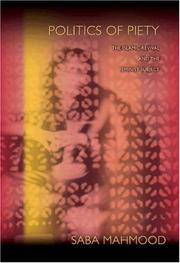
ISBN: 9780691149806 0691149801 0691086958 069108694X 9780691086941 9780691086958 Year: 2012 Publisher: New Jersey Princeton University Press
Abstract | Keywords | Export | Availability | Bookmark
 Loading...
Loading...Choose an application
- Reference Manager
- EndNote
- RefWorks (Direct export to RefWorks)
From the publisher. Politics of Piety is a groundbreaking analysis of Islamist cultural politics through the ethnography of a thriving, grassroots women's piety movement in the mosques of Cairo, Egypt. Unlike those organized Islamist activities that seek to seize or transform the state, this is a moral reform movement whose orthodox practices are commonly viewed as inconsequential to Egypt's political landscape. Saba Mahmood's compelling exposition of these practices challenges this assumption by showing how the ethical and the political are indelibly linked within the context of such movements. Not only is this book a sensitive ethnography of a critical but largely ignored dimension of the Islamic revival, it is also an unflinching critique of the secular-liberal assumptions by which some people hold such movements to account. The book addresses three central questions: How do movements of moral reform help us rethink the normative liberal account of politics? How does the adherence of women to the patriarchal norms at the core of such movements parochialize key assumptions within feminist theory about freedom, agency, authority, and the human subject? How does a consideration of debates about embodied religious rituals among Islamists and their secular critics help us understand the conceptual relationship between bodily form and political imaginaries? Politics of Piety is essential reading for anyone interested in issues at the nexus of ethics and politics, embodiment and gender, and liberalism and postcolonialism. In a substantial new preface, Mahmood addresses the controversy sparked by the original publication of her book and the scholarly discussions that have ensued.
Feminism --- Muslim women --- Islamic renewal --- Women in Islam --- Gender identity --- Religious life --- Religious aspects --- Islam --- Women in Islam. --- Islam. --- Feminism. --- Sociology of culture --- General ethics --- Sociology of the family. Sociology of sexuality --- Religious studies --- Egypt --- Féminisme --- Musulmanes --- Renouveau islamique --- Femmes dans l'Islam --- Aspect religieux --- -Muslim women --- -Islamic renewal --- -Feminism --- -Women in Islam --- -#SBIB:316.346H20 --- #SBIB:316.346H29 --- #SBIB:316.331H421 --- #SBIB:316.331H360 --- Sex identity (Gender identity) --- Sexual identity (Gender identity) --- Identity (Psychology) --- Sex (Psychology) --- Queer theory --- Emancipation of women --- Feminist movement --- Women --- Women's lib --- Women's liberation --- Women's liberation movement --- Women's movement --- Social movements --- Anti-feminism --- Islamic reform --- Islamic revivalism --- Islamic revivalist movement --- Ṣaḥwah (Islam) --- Religious awakening --- Wahhābīyah --- Islamic women --- Women, Muslim --- -Islam --- Positie van de vrouw in de samenleving: algemeen --- Positie van de vrouw in de samenleving: andere topics --- Morfologie van de godsdiensten: Islam --- Godsdienst en menselijk leven: algemeen --- Emancipation --- Reform --- Renewal --- Feminisme --- Vrouwen --- Egypte --- Politiek --- Vrouw --- Maatschappij --- Seksualiteit --- Theater --- Wetenschap --- Architectuur --- Film --- Godsdienst --- Cultuur --- Media --- Kleuter --- Kunst --- Ondernemerschap --- Poëzie --- Technologie --- Kind --- Geschiedenis --- Voorlichting --- Sociology of religion --- Community organization --- Feminism - Islamic countries --- Muslim women - Egypt - Cairo - Religious life - Case studies --- Islamic renewal - Egypt - Cairo - Case studies --- Feminism - Religious aspects - Islam --- Gender identity - Islamic countries --- Muslim women - Religious life - Egypt - Cairo - Case studies --- Muslimahs --- Gender dysphoria --- -Religious life --- Ethics --- Gender --- Norms --- Religious communities --- Book
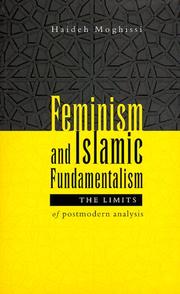
ISBN: 1856495906 1856495892 Year: 1999 Publisher: London Zed
Abstract | Keywords | Export | Availability | Bookmark
 Loading...
Loading...Choose an application
- Reference Manager
- EndNote
- RefWorks (Direct export to RefWorks)
Femmes musulmanes --- Fondamentalisme musulman --- Fundamentalism [Islamic ] --- Fundamentalisme [Islamitisch ] --- Integralisme [Islamitisch ] --- Integrisme [Islamitisch ] --- Intégrisme islamique -- Aspect politique --- Intégrisme musulman --- Islamic integralism --- Islamisme --- Islamisme politique --- Islamisme radical --- Islamistes --- Islamitisch fundamentalisme --- Islamitisch integralisme --- Islamitisch integrisme --- Mohammedaanse vrouwen --- Mouvements islamistes --- Vrouwen [Mohammedaanse ] --- Women [Muslim ] --- Islamic women --- Women, Muslim --- Legal status, laws, etc. (Islamic law) --- Muslim women. --- Women (Islamic law) --- Women (Islamic law). --- -Legal status, laws, etc. (Islamic law) --- -Fundamentalism, Islamic --- Feminism --- Islamic fundamentalism. --- Women --- Religious aspects --- Islam. --- Social conditions --- Philosophy and psychology of culture --- Islam --- Sociology of the family. Sociology of sexuality --- Religious studies --- Islamic fundamentalism --- Muslim women --- Fundamentalism, Islamic --- Islamism --- Religious fundamentalism --- Islamic law --- Emancipation of women --- Feminist movement --- Women's lib --- Women's liberation --- Women's liberation movement --- Women's movement --- Social movements --- Anti-feminism --- Religious aspects&delete& --- Emancipation --- Islamic countries --- Islamic feminism --- Muslimahs --- Book --- Postmodernism
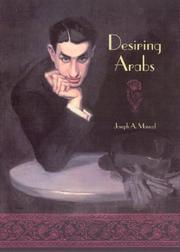
ISBN: 128196591X 9786611965914 0226509605 9780226509600 9780226509587 0226509583 6611965912 0226509591 9780226509594 Year: 2008 Publisher: Chicago University of Chicago press
Abstract | Keywords | Export | Availability | Bookmark
 Loading...
Loading...Choose an application
- Reference Manager
- EndNote
- RefWorks (Direct export to RefWorks)
Sexual desire has long played a key role in Western judgments about the value of Arab civilization. In the past, Westerners viewed the Arab world as licentious, and Western intolerance of sex led them to brand Arabs as decadent; but as Western society became more sexually open, the supposedly prudish Arabs soon became viewed as backward. Rather than focusing exclusively on how these views developed in the West, in Desiring Arabs Joseph A. Massad reveals the history of how Arabs represented their own sexual desires. To this aim, he assembles a massive and diverse compendium of Arabic writing fr
Civilization, Arab. --- Arabs --- Ethnology --- Semites --- Arab civilization --- Civilization, Semitic --- Islamic civilization --- Sexual behavior. --- Arab countries --- Arab world --- Arabic countries --- Arabic-speaking states --- Islamic countries --- Middle East --- Foreign public opinion, Western. --- Civilization, Arab --- #SBIB:316.7C160 --- #SBIB:39A77 --- Sexual behavior --- Cultuursociologie: contact tussen culturen --- Etnografie: Noord-Afrika en het Midden-Oosten --- Sociology of culture --- Sociology of the family. Sociology of sexuality --- Sociology of literature --- Arab states --- Sexology --- History --- Public opinion, Western. --- Arab countries. --- arab, middle east, sexual, sexuality, attraction, desire, western, civilization, culture, cultural, academic, scholarly, research, myth, bias, prejudice, sex, prude, 19th, 20th, 21st, century, writing, attitude, history, historical, kink, study, thesis, memory, recall, sin, crime, disease, gay, lesbian, lgbtq, queer, orientation, deviant. --- Attitudes --- Sexuality --- Book --- Imaging
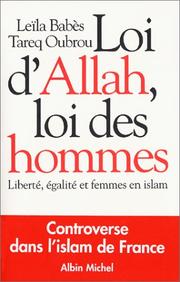
ISBN: 9782226132789 2226132783 Year: 2002 Publisher: Paris Albin Michel
Abstract | Keywords | Export | Availability | Bookmark
 Loading...
Loading...Choose an application
- Reference Manager
- EndNote
- RefWorks (Direct export to RefWorks)
Women in Islam --- Women's rights --- Liberty --- Religious aspects --- Islam --- Law --- Sociology of minorities --- Social policy --- France --- Comité permanent de Contrôle des services de renseignement et de sécurité (Comité permanent R) --- islam --- droits de la femme --- искоренување насилство врз жените --- женски права --- prava žena --- ženská práva --- заштита на женските права --- родова рамноправност --- Frauenrechte --- права на жената --- ženska prava --- kvindens rettigheder --- kvinnors rättigheter --- práva žen --- drepturile femeilor --- práva žien --- права жена --- sieviešu tiesības --- δικαιώματα της γυναίκας --- Rechte der Frau --- naiste õigused --- women's rights --- derechos de la mujer --- diritti della donna --- të drejtat e grave --- direitos da mulher --- cearta na mban --- nők jogai --- drittijiet tan-nisa --- rechten van de vrouw --- moterų teisės --- prawa kobiet --- pravice žensk --- права на жените --- naisten oikeudet --- mahomedanism --- islamism --- moslimský veriaci --- islámské náboženství --- sunita --- islámská církev --- mohammedanisme --- šíita --- mohamedanizmus --- muslimi --- muhamedanisme --- mohamedánstvo --- Mohammedanism --- muhameedlus --- suna --- muhamedānisms --- muslimské náboženství --- muhamettilaisuus --- mahometonybė --- mešita --- Muhamedanizëm --- islám --- ισλαμισμός --- Iżlam --- islamas --- islams --- islamismo --- iszlám --- ислям --- ислам --- Ioslam --- Religious aspects&delete& --- Vast Comité van Toezicht op de inlichtingen- en veiligheidsdiensten (Vast Comité I) --- Islam - Women. --- Women's rights - Religious aspects - Islam --- Women's rights - Islamic countries --- Liberty - Religious aspects - Islam --- Freedom (Islam) --- Equal opportunities --- Religious texts --- Migration background --- Points of view --- Legislation --- Book
| Listing 1 - 10 of 10 |
Sort by
|

 Search
Search Feedback
Feedback About UniCat
About UniCat  Help
Help News
News